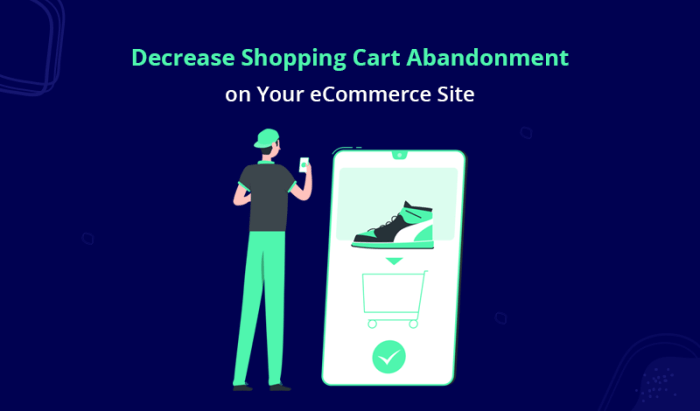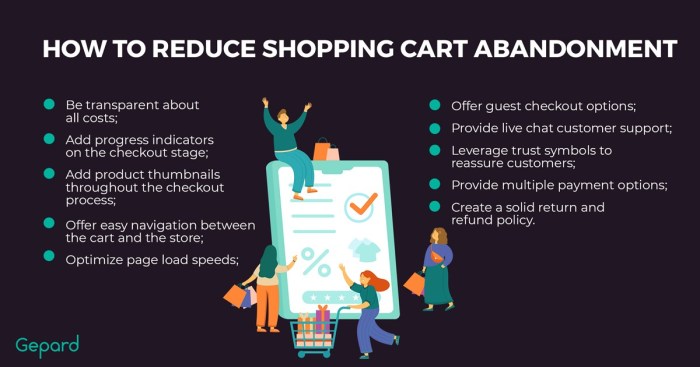Exploring the nuances of cart abandonment in ecommerce stores can reveal key insights into customer behavior and preferences. By understanding the reasons behind abandoned carts, businesses can implement strategies to minimize this occurrence and maximize conversions. Let’s delve into the world of reducing cart abandonment in ecommerce stores.
In this guide, we will cover various aspects of cart abandonment, from identifying reasons behind it to optimizing the checkout process and leveraging incentives to entice customers to complete their purchase.
Understanding Cart Abandonment
In the world of ecommerce, cart abandonment refers to the situation where a customer adds items to their online shopping cart but does not complete the purchase transaction. This phenomenon is a common challenge faced by online retailers.
Reasons for Cart Abandonment
There are several reasons why customers abandon their shopping carts. Some of the common factors include unexpected shipping costs, complicated checkout processes, lack of payment options, and simply browsing without the intention to buy immediately.
Statistics on Cart Abandonment Rate
- On average, the cart abandonment rate in online stores is around 69.57% globally.
- Mobile devices have a higher cart abandonment rate compared to desktops, with a rate of 85.65%.
- According to studies, the top reason for cart abandonment is high extra costs that are revealed at the checkout stage.
Identifying Reasons for Cart Abandonment
Understanding why customers abandon their shopping carts is crucial in reducing cart abandonment rates in ecommerce stores. Let’s explore some common reasons behind this behavior.
Impact of Unexpected Costs on Cart Abandonment
Unexpected costs during the checkout process can be a major deterrent for customers, leading to cart abandonment. These costs may include high shipping fees, taxes, or additional charges that were not initially displayed on the product pages. Customers who feel misled or surprised by these extra expenses are more likely to abandon their carts.
Complicated Checkout Processes
A complicated checkout process with multiple steps, required account creations, or tedious form fillings can frustrate customers and push them towards abandoning their carts. Customers expect a seamless and user-friendly experience when making a purchase online. Any unnecessary obstacles in the checkout process can deter them from completing the transaction.
Optimizing the Checkout Process

To reduce cart abandonment in ecommerce stores, it is crucial to optimize the checkout process. A smooth and hassle-free checkout experience can significantly increase conversion rates and customer satisfaction.
Simplify the Checkout Process
- Minimize the number of steps required to complete a purchase. Avoid unnecessary form fields and only ask for essential information.
- Offer multiple payment options to cater to different customer preferences.
- Implement an auto-fill feature to help customers quickly fill in their details.
Importance of Guest Checkout Options
- Allowing guest checkout eliminates the need for customers to create an account, reducing friction and speeding up the checkout process.
- Some customers may be hesitant to create an account due to privacy concerns, so providing a guest checkout option can help capture these sales.
Implementing Progress Indicators
- Progress indicators show customers how far along they are in the checkout process, reducing anxiety and uncertainty.
- By breaking down the checkout process into manageable steps, progress indicators make it easier for customers to complete their purchase.
- Clear progress indicators can also encourage customers to continue through the checkout process, knowing how close they are to completing their order.
Building Trust and Credibility

Building trust with customers is crucial to reducing cart abandonment in ecommerce stores. When customers feel confident in the credibility of your online store, they are more likely to complete their purchases. Here are some strategies to help build trust and credibility:
Role of Security Badges and Trust Seals
Security badges and trust seals play a significant role in establishing trust with customers. These symbols indicate that your website is secure and that sensitive information is protected. Displaying recognized security badges, such as SSL certificates or payment provider logos, can reassure customers and increase their confidence in making a purchase.
Customer Reviews and Testimonials
Customer reviews and testimonials can greatly influence purchase decisions. Positive feedback from previous customers serves as social proof of your products or services. Encourage satisfied customers to leave reviews and showcase these testimonials on your website. This transparency and authenticity can help build trust and credibility with potential buyers.
Offering Incentives and Discounts
When it comes to reducing cart abandonment in ecommerce stores, offering incentives and discounts can be a highly effective strategy. By providing customers with a reason to complete their purchase, such as a discount or special offer, you can motivate them to finalize their transaction.
Effectiveness of Offering Discounts
- Discounts can create a sense of urgency and encourage customers to make a purchase sooner rather than later.
- Offering incentives can help sway indecisive customers who are on the fence about completing their purchase.
- Providing discounts can also attract price-sensitive shoppers who are looking for the best deal.
Successful Incentive Strategies
- Flash sales: Limited-time offers that create a sense of urgency and drive immediate action from customers.
- Percentage discounts: Offering a certain percentage off the total purchase can entice customers to buy more items.
- Free shipping: Providing free shipping as an incentive can help eliminate any additional costs that may deter customers from completing their purchase.
Impact of Limited-Time Offers
- Limited-time offers can create a fear of missing out (FOMO) among customers, prompting them to take advantage of the deal before it expires.
- Time-sensitive discounts can drive impulse purchases and increase conversion rates as customers feel the need to act quickly.
- By leveraging limited-time offers strategically, ecommerce stores can effectively reduce cart abandonment and boost sales.
Utilizing Remarketing Techniques
Remarketing is a powerful tool that can help ecommerce stores recover abandoned carts by targeting customers who have shown interest in a product but did not complete the purchase. By using personalized email reminders and compelling messages, businesses can entice these customers to return to their carts and complete the transaction.
Benefits of Personalized Email Reminders
- Personalization: Addressing the customer by their name and referencing the specific items left in the cart can make the reminder more relevant and engaging.
- Increased Conversions: Studies have shown that personalized emails have higher open and click-through rates, leading to a higher chance of converting abandoned carts into sales.
- Building Customer Relationships: By showing customers that you value their interest in your products, personalized emails can help build trust and loyalty over time.
Tips for Creating Compelling Remarketing Messages
- Urgency: Create a sense of urgency by mentioning limited stock or time-sensitive offers to encourage customers to act quickly.
- Clear Call-to-Action: Make it easy for customers to complete their purchase by including a prominent call-to-action button in the email.
- Offer Incentives: Providing discounts or free shipping can motivate customers to return to their carts and complete the purchase.
Epilogue
As we conclude our discussion on reducing cart abandonment in ecommerce stores, it becomes clear that by implementing the right strategies and focusing on customer trust, businesses can significantly improve their conversion rates and drive sales. By prioritizing a seamless shopping experience and building credibility, businesses can create a loyal customer base and increase revenue.
Popular Questions
What are some common reasons for cart abandonment?
Common reasons include unexpected costs, complicated checkout processes, and lack of trust in the website.
How can offering discounts help reduce cart abandonment?
Discounts can incentivize customers to complete their purchase by providing them with cost savings and a sense of urgency.
What role do customer reviews play in reducing cart abandonment?
Customer reviews and testimonials can build trust and credibility, helping to alleviate concerns and encourage customers to make a purchase.
Why is remarketing important in reducing cart abandonment?
Remarketing allows businesses to reach out to customers who have abandoned their carts, reminding them of their intended purchase and encouraging them to return.


